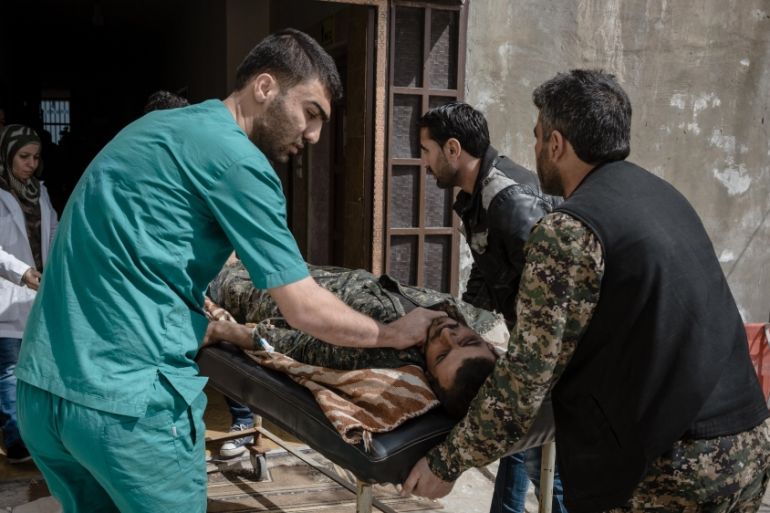A slow recovery for injured fighters in northern Syria
Border closures have caused problems for hospitals in the area, with shortages of key medicines and equipment.

Hasakah, Syria – The ambulance delivering the injured fighters bore no markings.
It did not arrive with the flash or wail of a siren, and the unconscious men inside were carried out not on wheeled stretchers, but on thin, polyester sheets.
|
|
Moments before its arrival, doctors, nurses and wide-eyed trauma patients – still clad in military fatigues – sat in the reception of the Martyr Sarya Hospital, just outside of Hasakah in northern Syria, drinking sugary tea, smoking cheap Russian cigarettes and swatting flies.
Like the three injured fighters who arrived this afternoon, a majority of the hospital’s patients came from south of Shaddadi, an area of strategic importance that was recently liberated from the Islamic State of Iraq and the Levant (ISIL, also known as ISIS) group. Most of the patients are Kurdish or Syrian opposition fighters.
“They were clearing a house in Shaddadi. A remote-controlled explosive collapsed the building on them,” radiologist Akram Chikho told Al Jazeera, referring to the three new patients. Most patients at the hospital were injured by car bombs, shot by ISIL snipers or wounded by improvised explosive devices, he added.
READ MORE: Why Syria’s Kurds want federalism, and who opposes it
Buoyed by recent military and political gains, some injured fighters at the hospital said they were eager to rejoin the battle against ISIL. In February, Syrian Kurds in the country’s north gained control of Shaddadi, viewed as an important precursor to retaking ISIL’s self-proclaimed capital of Raqqa.
“I’ll go back to the frontlines when I’ve recovered. I don’t want my efforts to have been for nothing,” Adnan, 26, a Syrian army defector from Hasakah, told Al Jazeera.
The United States, which has allied with Syrian Kurds in the conflict, estimates that ISIL-controlled territory has shrunk by 20 percent since its peak in 2014. But the priority for Syrian Kurds is to connect Afrin, in northwestern Syria, to the Kurdish-controlled region in the northeast. “[We will do this] with or without the help of the international community,” said Akram Hasso, president of the Kurdish government in northern Syria.
You can smuggle people and guns across borders, but you can't smuggle an x-ray machine.
In March, the Syrian Kurdish Democratic Union Party (PYD) and allied groups declared a federal democratic system in northern Syria, and Kurdish authorities have opened representative offices this year in Moscow, Stockholm and Berlin.
“Kurdish leaders perceive the international support from Russia and the US to be an important part of their campaign – yet, they worry that it’s merely a marriage of convenience,” Renad Mansour, a fellow at the Carnegie Middle East Center, told Al Jazeera. “As such, politically, their efforts are still weak and they have anxieties about the future.”
Following the unilateral declaration, which was met with international condemnation, neighbouring Turkey and Iraq imposed border closures. This has caused problems for medical facilities in Hasakah, with one pharmacist saying she now lacks close to half of the medications she would normally need. Surgical equipment is also lacking, with some key medical equipment stranded on the Turkish side of the border, doctors told Al Jazeera.
“You can smuggle people and guns across borders, but you can’t smuggle an x-ray machine,” Hamgeen Sulieman, the manager of a People’s Protection Units (YPG) medical facility in Qamishli, told Al Jazeera.
One YPG commander at a rehabilitation centre in Hasakah said border closures presented a major obstacle for Syrian Kurds in their fight against ISIL. “Comrades who have lost legs or eyes need to go abroad for treatment, and can’t because of the embargo,” the commander said, speaking to Al Jazeera on condition of anonymity.
Syria civil war – Physicians under fire
Meanwhile, at the YPG medical facility in Qamishli – the would-be capital of an autonomous Kurdish region in northern Syria – injured fighters lay in uncomfortably humid wards, the walls hung with large portraits of Abdullah Ocalan, the founder of the Kurdistan Workers’ Party (PKK).

In each ward, at least one copy of Ocalan’s writings can be found. One YPG commander said that this “ideological training” had become part of the recovery process.
A 22-year-old YPG fighter from Qamishli, who was shot in the kidney while manning a checkpoint near Shaddadi, told Al Jazeera that he read Ocalan’s work during his recovery and now believes the PKK leader had found a solution, not only for the Kurdish people, but “for the whole of the Middle East”.
Sulieman, who began managing the YPG facility in Qamishli on a volunteer basis when it opened almost two years ago, said the facility used to be much less organised and the casualties greater in number than now. When an injured fighter needed a blood transfusion, a nurse would run to the nearest mosque and call out for donors over the loudspeaker. Hundreds of volunteers would arrive, eager to donate, Sulieman said.
Many doctors have also chosen to volunteer their time at such facilities, he added: “It’s the least they can do when the militants are fighting to protect civilians.”
Follow Jonathan Brown on Twitter: @jonathaneebrown